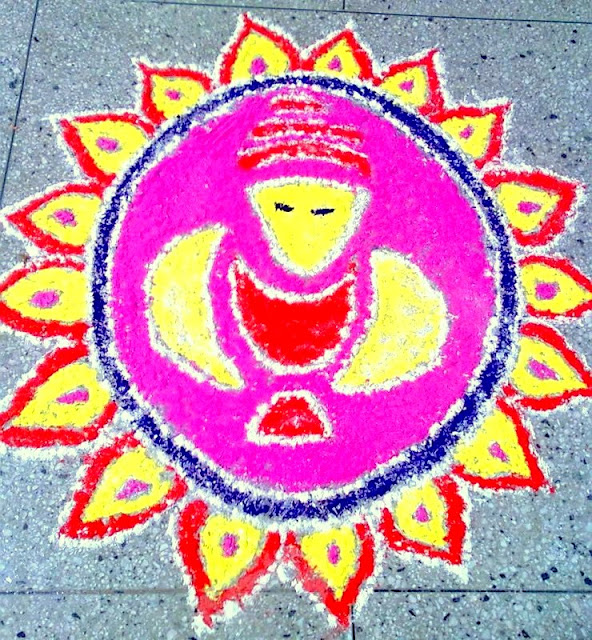Dev Uthani Ekadashi (Prabodhani Ekadashi)
 |
| This Rangoli is devoted to "Lord Ganesha" |
On
the 11th Day or Ekadashi of Shukla Paksh in the month of Karthik, the festival of Dev Uthani Ekadashi is
celebrated. It is also called Prabodhani Ekadashi.It is believed that on this
day Lord Vishnu had woken up after a rest of four months. Hence, this day marks
the end of Chaturmaas. This day is considered as a very auspicious day and
marriages take place on this day all over India. All auspicious work that could
not be done during the Chaturmaas are started on this day.
Ekadashi
Parana is done after sunrise on next day of Ekadashi fast. Parana means
breaking the fast. It is necessary to do Parana within Dwadashi Tithi unless Dwadashi is over before sunrise.
Not doing Parana within Dwadashi is similar to an offence.
At times Ekadashi fasting is suggested on two
consecutive days. It is advised that Smartha with family should observe fasting
on first day only. The alternate Ekadashi fasting, which is the second one, is
suggested for Sanyasis, widows and for those who want Moksha. When alternate
Ekadashi fasting is suggested for Smartha it coincides with Vaishnava Ekadashi
fasting day. Ekadashi fasting on both days is suggested for staunch devotees
who seek for love and affection of Lord Vishnu.
 |
| "This Picture is taken from Udaipur Times" |
Vidhi
/ Method of Performing the Puja
The
courtyard or the room is cleaned and with chuna (limestone) and with geru the
image of Dev is drawn.
In
the evening, puja is performed with water, roli, moli (coioured thread), 1-1/4 kg
rice, fruits, cotton, Sugar cane, mooli, money etc.
The
deepak is then lit and devotional songs are sung.
People
perform Tulsiji ka Vivah on this day with Shaligram.
Tulsi
vivah is celebrated on the next day of Karthik Ekadashi. On this day Tulsi is
married to Saaligram.
The
tulsi plant is held sacred by the Hindus as it is regarded to be an incarnation
of Mahalaxmi who was born as Vrinda. Tulsi was married to demon king Jalandhar.
She prayed to Shri Vishnu that her demon husband should be protected, with the
result no God was able to harm him. However on the request of the other Gods,
Shri Vishnu took the form of Jalandhar and stayed with the unsuspecting Tulsi.
When the truth emerged after Jalandhar’s death, Vrinda cursed Shri Vishnu and
turned him to stone (Saaligram) and collapsed. From her body emerged the tulsi
plant. That is why Vishnu puja is considered incomplete without tulsi leaves.
The
very name Tulsi, that which cannot be compared, the "incomparable
one", has spiritually uplifting qualities. Tulsi has been found to possess
extraordinary powers of healing.



Comments
Post a Comment